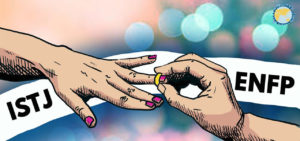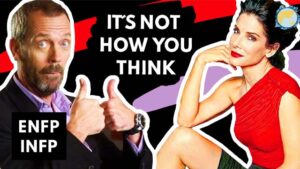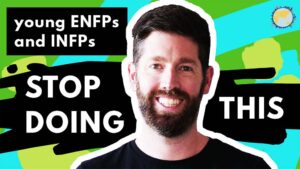ENFPs and Social Anxiety
Feeling some kind of social anxiety, nervousness, or shyness is not rare for ENFP type, and in this post, we will dive into why this often affects us ENFPs.
If you prefer reading, here is a video transcription made with Otter.ai
We’re going to look at being an ENFP with social anxiety.
Answering the question: “Is it possible to be an ENFP with social anxiety, and also, how common is it for ENFP to have social anxiety for that matter?”
Of course, it is possible which might surprise some people because, on the surface, many ENFPs are very outgoing and friendly and don’t seem to have a care in the world. So how would that work with social anxiety? Now, one thing you might not know about me is the first book I ever published was actually about social anxiety, the publisher ultimately decided it was a bit better to position it around self-confidence. Those two are very related by the way, and I’m going to explain that. But this is an area I know quite a bit about.
So the first thing we need to figure out in very practical terms is what actually is anxiety and why does it happen? We could overcomplicate this and get into all kinds of psychological definitions but that would be stupid and not very useful.
The first thing with it that’s tough is it’s this ambiguous feeling we have, right? Where it’s basically our body’s telling us something could happen. We don’t really know what it is. Get ready! We could feel anxious because we’re going to go give a speech, we could also feel anxious because we’re being followed by someone who looks really weird. We could feel anxious before we go hang out with our friends, even though they’re our friends and we should just feel happy. The feeling of anxiety is this neutral feeling actually, it’s basically something in our unconscious saying: “Hey, pay attention, something could happen, you should be prepared.” Some people will feel anxiety and interpret it as preparation. They’ll think: “Oh, yeah, that’s my body getting ready, I’m ready for this. Whatever happens, I’m up for the challenge.” Other people will feel anxiety and say: “Whoa, that’s, that’s scary. I don’t like that feeling I should run away from whatever’s causing it.” Same feeling, different interpretation, different action, that’s really important to understand.
ENFP anxiety issues: We’re not wired for the 21st century
Something else that’s important to understand is our bodies are not wired for the 21st century, we don’t have that much real-world danger, we don’t have that much to feel fear of. Kids with allergies (I had a lot of allergies, by the way) still do. One of the leading theories is that you get allergies is because you grew up in too clean of an environment and your immune system didn’t get enough practice. I think a lot of anxiety issues are actually tied in with that where we don’t have enough real fear and enough on or off threats.
So we live in a state of unknown anxiety, sort of lingering anxieties. We have a mean email that we haven’t open, so that sticks in our minds for a couple of days.
So very different way to interact with anxiety was like: “Oh shit, there’s a bear there!” and then you run away, and then you’re either eaten by the bear or you’re not and then the anxiety goes away one way or the other.
Another part of anxiety is essentially that we’re thinking about the things that could go wrong. So if you’re going to meet your friends and you’re thinking about that you might say something stupid, or someone will make fun of you, or you might drop food all over yourself, because you do that a lot, or whatever it is, that will naturally create some level of anxiety. That can become associated with different environments. So let’s say a few times you feel anxious about going to meet your friends, because there’s someone there, maybe not one of your friends, that you really don’t like and so you start associated anxiety with meeting your friends.
So a lot of the time when you get some kind of ongoing anxiety condition, it’s because of repetitive associations, and then it just becomes habitual even though you don’t really know where it’s coming from you just have these associations and that’s definitely not good. Now as ENFPs our primary function is Extraverted Intuition, meaning we are really good at coming up with a lot of ideas. So someone who’s always thinking about what could happen, all the different possibilities, it can be really positive, It can also be a machine for creating anxiety because if you direct it in the wrong way, you can end up thinking of all the bad things that could happen.
So I could say to you, hey, when you go out with your friends tonight, what are all the fun and amazing things that could happen? And then if you think of all the possibilities, you’re going to feel excited and anticipate the night in a really positive way. But if I say, what are all the bad things that could possibly happen tonight, and you let your extroverted intuition go off on that you’re going to be anxious for sure you’re going to be terrified to ever leave your house again. This is of course why learning to control and direct your thoughts on some level and ask the right questions is really, really important.
ENFP personality type tip: We care what people think and we value friendships
The next thing to keep in mind in terms of ENFPs specifically and social anxiety is that we really care what people think and we value friendships, we, we value the people around us, and we’d like people to be happy when they’re around us. That does make rejection harder and it also means that social situations not going well, something that can be scary to us if we’re being honest.
So there are probably many cases where someone who is actually quite socially awkward and not good with people has a lot less social anxiety than someone, let’s say an ENFP who’s actually very social and gets along with people well, but is so concerned with getting along with people that they’re overthinking it, and they’re trying to be perfect in that situation, which isn’t uncommon for ENFPs. Whereas the person who’s kind of socially awkward doesn’t really care. Having the best relationship with everyone doesn’t really matter to them.
That’s not what they’re about to the fact that we think of all the possibilities and if we don’t control our mind, the negative possibilities, plus the fact that we really do care about social situations and what happens around us can be a recipe for more social anxiety than less. I have met more than one ENFP with social anxiety that has shared this with me, I’m sure there are definitely more that have not shared it with me. One of the things is, you’re usually not going to pick it up from someone when you’re out with them (because not always the case) but sometimes with social anxiety, you feel it before getting into that social environment, getting into the event or getting with your friends or whatever else and then actually, once you’re in the flow and things you might become more normalized and that’s the case with many things we feel anxiety about. It’s anticipating it where we feel the fear and anxiety and then once we’re actually doing the thing, we’re too in the moment to think about it and we don’t actually experience any anxiety.
That might be an indication of one of the first tips here for dealing with social anxiety, which is to do the thing. If you’re doing it and you’re in the moment, you’re less likely to actually be feeling the anxiety because you’re doing it.
How to deal with fear or phobia as an ENFP
One of the ways that we can deal with any kind of fear or phobia is actually taking action and practicing being courageous. You don’t even have to face the thing you are afraid of. But just practicing being afraid of anything, and then taking action anyhow will make you more courageous in all areas. It seems funny, but it is true.
Of course, if you can do it in the area that you feel fear at that is even better. That leads to another thing you need to understand about social anxiety and anxiety in general is I think, when we feel anxiety, it’s basically were weighing in our heads, what are the bad things that could happen and how equipped am I to handle that situation.
So if you generally feel quite confident in yourself to handle unknown situations, and social environments, in general, you’re less likely to feel anxiety about going into a social environment, especially with unknown factors. Because you think, hey, I’ve been in these sorts of situations before I’ve been able to handle them, I’ll probably be able to handle them again. In many cases, someone will actually have these skills and abilities to handle themselves, but they won’t reflect on that, so they don’t really remind themselves how good they are at handling the unknown and when they do that, and just reflect on the times they’ve been able to handle unknown situations, it increases their confidence, and therefore it reduces anxiety.
I believe there are almost two parts to how we experience anxiety, one part is actually quite rational, it is some part of our unconscious, doing the equation and saying, hey, here are the threats and here are your abilities. Do they add up? You know, if you’re a season bear hunter, and you hear a bear you’re going to feel less fear, then if you are totally clueless, and well, then you might actually think bears are like teddy bears and not be scared. That’s actually a very rational thing to do, to weigh your abilities and weigh possible threats and then have a level of anxiety that indicates the difference. If it’s this easy environment, and you’re extremely well equipped, you’re not going to feel any anxiety.
There is another part to it and this is what I was speaking of earlier. Our system just getting out of whack, where you are someone who’s actually quite sociable and liked and you do find in that environment, but you feel social anxiety anyhow, because of some kind of past association or because of a false impression of your own abilities. Those are two things that you want to clear up. Maybe you don’t have a realistic view of how you are so in your head, you see like, oh, people don’t like me. I’m awkward, I’m this but in reality, you’re not and people do like you. If your confidence needs a boost you can find a great resource on my website called How to be more confident and make things happen.
If you were to work with a therapist, what they would do is they would work with you to see that actually you do have those abilities and you do have those skills and that would adjust how your unconscious is weighing the threat, and you would feel less anxiety.
The other thing they would, of course, do I mentioned is some kind of exposure therapy where you gradually see like, Oh, this isn’t so bad. If your anxiety is so bad that you’re really avoiding people at all costs.
Essentially what exposure therapy does is it will help break that negative association. If for whatever reason, whether it’s peanuts or some asshole who was out with your friend that really didn’t make you feel good. Spending positive time in social environments will gradually break that association or there are other things you can do to accelerate this process such as various visualization exercises, or working with someone who can help you basically accelerate through and attach more and more positive associations with the around people or whatever the thing is, that causes anxiety for you. That will help accelerate the change and you can also do the same by trying to basically break the negative association as well.
So if you are an ENFP with social anxiety, I hope you found this insightful and help to figure out a little bit more about why it could be happening and do apply some of the advice and see what kind of positive changes it makes for you.




